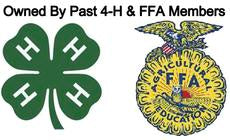Bet you didn't know that during a rainstorm, cows will walk directly into the rain as far as their fences will allow and stand in a row facing into it? Or that cattle are family-oriented and will gather in clan clusters every evening? They even have something akin to a nanny system, with baby calves gathering at night around a single female relative, farmer Buck Holsinger says.
But one thing you probably did know: Farming is not for the faint of heart. It is hard work, unpredictable. And young Americans are increasingly opting out.
So where does the U.S. Department of Agriculture go to find that rare breed of practical, no-nonsense, get-the-job-done-type person needed to fill the shoes of retiring farmers?
Try the growing cadre of unemployed veterans coming out of more than a decade of war with military skills that don't necessarily translate into civilian jobs.
"We think veterans are a very good fit in agriculture," Deputy Secretary of Agriculture Krysta Harden said in an interview. "Many have the skills needed: Strong leaders, they are used to hard work, and they are going to work until the job is done. Farming is not 9-to-5, and they are used to that."
Under the 2014 Farm Bill, the Agriculture Department began giving veterans preference for National Resource Conservation Service programs to protect or enhance the environment. The service offers financial incentives - and know-how - to farmers willing to implement its programs. Veterans get preference. So do new farmers.
Air National Guard C-130 pilot Buck Holsinger was both when he tapped into the service's incentives pool.
The Shenandoah Valley farmer flew transport planes for the Air Force for 12 years when he decided to get out and return with his wife and young children to his family farm here, north of Harrisonburg. Holsinger, who was being activated for a second deployment in Iraq, wanted a more stable life and healthier food for his family.
He bought cattle, read books and figured out trial by trial and mistake by mistake how to breed them, graze them on rotating fields and keep his pastures thick and healthy for them. His cattle are grass-fed and hormone-free, and they live in the open on his 72-acre farm.
Though he still works from home as a computer engineer for IBM, he hopes one day to support his family on farming alone.
He jumped on the government incentives to improve sustainability on his land. The first one: creating a buffer between his cattle and the stream that runs along his farm - even though that meant Holsinger's cows no longer could drink from that obvious water source.
"We are part of the Shenandoah River, which feeds into the Potomac, which feeds into the Chesapeake Bay," Holsinger said on a crisp September day while trudging through his fields. "In an effort to clean it up, they helped me fence out my stream."
In a 15-year program, the government paid him $95 an acre for 10 acres - essentially renting the land so he wouldn't use it. It also helped him plant saplings along the stream to develop a wildlife habitat. Now he has young deer and mallard ducks living there, he said.
Giving up his cows' main water source also meant giving up their access to the majority of shade trees on his farm. So he applied for money for other uses: to pipe in water to each grazing area and to plant hardwood trees in sections across his land - a project known as silvopasture - that ultimately will provide some shade in each 10-acre paddock while protecting the soil.
The projects were time-consuming and hard. But they made sense to a guy who believes in the holistic health of his farm.
"Grass is a good sustainable food source," he said. "God gave us cattle that eat grass, and they take grass and make it into food we can eat.
"I want to grow good, sustainable food, for my family and friends and customers now."
The Agriculture Department is working with its Defense Department counterparts to get the word out to veterans that, should they choose to go into farming, there are government packages available. The government won't help buy their land, but it promises to rate them high on the priority list for money to improve environmental practices on their farms.
Still, not all veterans who apply for incentives will receive them. There are more than 2,500 Natural Resources Conservation Service field offices across the country - each representing a different farming district and getting a portion of the overall pot of money.
In Virginia alone, there are 42 districts, said Cory Guilliams, the conservationist for Holsinger's Harrisonburg district, which reaches from the Shenandoah Valley and Northern Virginia over to Fredericksburg.
Guilliams explained there are a number of different types of "fund pools" for farmers, depending on the types of farms and the problems they are dealing with. The rankings for applicants also vary, based on environmental benefit and types of concerns ranging from national priorities to state to local issues.
Holsinger was one of just two applicants in his district who benefited both as a new farmer and a veteran, he said.
But Guilliams noted there just aren't enough resources to go around. "Funds are very limited in Virginia," he said. "Over the past couple of years, we've taken cuts in our funding."
The Virginia office of the conservation service had hoped for $20 million for the environmental quality incentives program this past year. But the state was allocated $13 million. Meanwhile, funding requests exceeded $62 million.
"And I think it's similar nationwide," he said.
Holsinger was lucky. But his friend Paul Dorrance, a farmer in Chillicothe, Ohio, producing grass-fed, nongenetically modified, hormone-free meat, fell through the cracks.
Dorrance, also an Air Force pilot, left active duty in 2013 and jumped whole hog into farming. He raises cows, sheep, chickens, turkeys and pigs on 111 acres while living off the nest egg he and his wife had saved.
Dorrance applied last year for an environmental quality incentives program grant to build fencing to keep his animals away from a creek. He was declined without explanation, he said.
With the new defense-agriculture push, he applied for another grant this year to run water to his fields, the same way Holsinger did. He's still waiting for an answer, he said.
As the only natural farmer in his district, Dorrance wonders whether his chemical- and hormone-free approach is not popular in a region of commercial farms or whether approval depends on how proactive his district representative is.
So he's frustrated. "I think veterans and ex-military are exactly what agriculture needs," he said. "But what the government and the USDA need to do is get out of the way."
Conservation service officials in Ohio declined to comment on the specifics of the case, citing the privacy of the application. But an official in the national office said that requests for money under the conservation programs far exceed the money available, noting that in 2013 fewer than half of the qualifying applications were funded.
Holsinger stood recently in the middle of a pasture, talking about the rotational grazing he's implemented and how it helps force his cows to eat more than just their favorite foods "at the buffet" - i.e., clover. By using electric fences, he can keep cattle in smaller areas, ensuring they eat not only their first choices, but also second and third favorites.
He's developed a strong relationship with Guilliams and with district farmers who work for the USDA and have been sounding boards for the young farmer as he works out his system.
He pointed past his land at a subdivision of houses, built on what used to be his neighbor's farm. A developer paid top dollar for that land, making it close to impossible for a young person with limited means to buy a farm.
But if the stars align, and the land is yours, and the incentives are granted, Holsinger believes farming can bring both healing and sustenance to veterans.
"There's a therapy to growing and seeing your product every day," he said.
And when he grows the farm big enough that he can leave his job with IBM and hire a hand to help him out, Holsinger knows exactly who he is going to seek: a veteran.
"If you have made that commitment to our country, there's no question they've instilled that work ethic in you that I feel the farm gave me many years ago," he said.
"We understand hard work. We understand taking a plan and executing it, having a desire to make it happen, no matter what."
November 10, 2015





